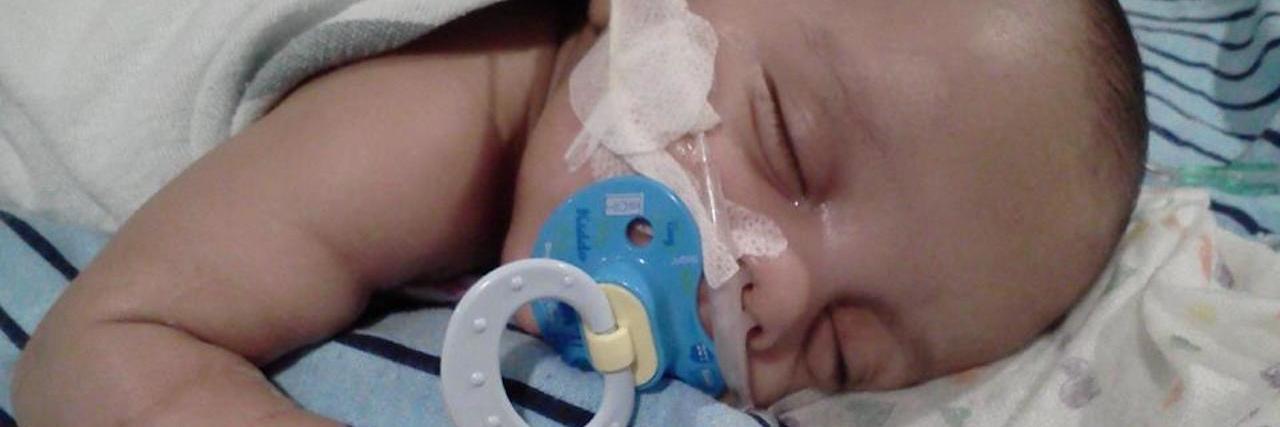If the boogeyman had a name, his initials would be R.S.V.
Every time I hear those letters, my heart beats a little faster and a tingling sensation rushes through my veins.
Four years ago, I’d never heard of respiratory syncytial virus (RSV). I only learned about it when my twins, who had just gotten out of the NICU, started showing symptoms.
The virus is actually very common. We’ve most likely all had it at one point or another.
For most people, RSV presents as a cold with no need for medical attention. But for premature infants and babies with other health issues, RSV can be fatal. You may think that sounds dramatic, but I have first-hand knowledge of how dangerous this virus can be.
Dominic, my tiniest twin, graduated from the NICU on Halloween 2013, right before his due date. On January 2nd, 2014, he started breathing fast, so we took him to the hospital. He spent the next four weeks in the PICU battling RSV.
During that month, my 6-pound baby stopped breathing, had to be resuscitated, suffered a collapsed lung and needed a blood transfusion. And those are just a few of the traumatic events he endured. On more than a few occasions, the doctors told me, “We just don’t know what’s going to happen.”
His brother, Julian, only spent a few nights in the hospital. Thankfully, with the help of the doctors, nurses and prayers sent by so many loved ones, they both made a full recovery. But when Dominic came home, he was much smaller than Julian. And he remains smaller to this day.
I recently found out that October is RSV Awaresness Month. That’s fitting, because it’s right before RSV season starts. In an effort to help other NICU parents, I want to share some of the knowledge I gained while my babies were sick.
Here is what I want every NICU parent to know:
1. Take it seriously!
It seemed like Dominic had just left the NICU when he started getting sick again. I didn’t want to be “that mom” — the one who overreacts to every-little-thing wrong with her baby. So I started second guessing myself. I thought I could handle it myself.
But remember this: if your baby is having trouble breathing, that is a medical emergency. RSV is dangerous. Don’t wait to get treatment.
2. Go to a children’s hospital.
I know that’s easier said than done. But regular hospitals are not trained, nor are they equipped to deal with premature babies. I took Dominic to my local hospital when he first started showing symptoms. They told me he had pneumonia, gave him a breathing treatment and antibiotics, and sent us home.
A couple hours later, Dominic was getting worse, so we hit the road. Our closest children’s hospital was over an hour away. Luckily, my mom was available to ride with me. When we arrived at the ER, Dominic was immediately rushed to the back for testing and treatment. As it turns out, he didn’t have pneumonia. He had RSV — and it was bad.
3. RSV is not asthma.
My oldest son has dealt with asthma since he was 2 years old. So when I saw Dominic having a hard time breathing, I immediately gave him a nebulizer treatment in order to help open his airways. The symptoms looked so similar: shallow breathing and retractions (caving in) around his collar bone. I later learned that nebulizers and inhalers aren’t usually effective when treating RSV.
If you know someone with a baby in the NICU, or know someone who was recently discharged, please share this with them. NICU parents are busy. They may not know anything about RSV. You could help them make better decisions than I made.
Click here for more information on RSV.
Follow this Journey at Not an Autism Mom
We want to hear your story. Become a Mighty contributor here.

